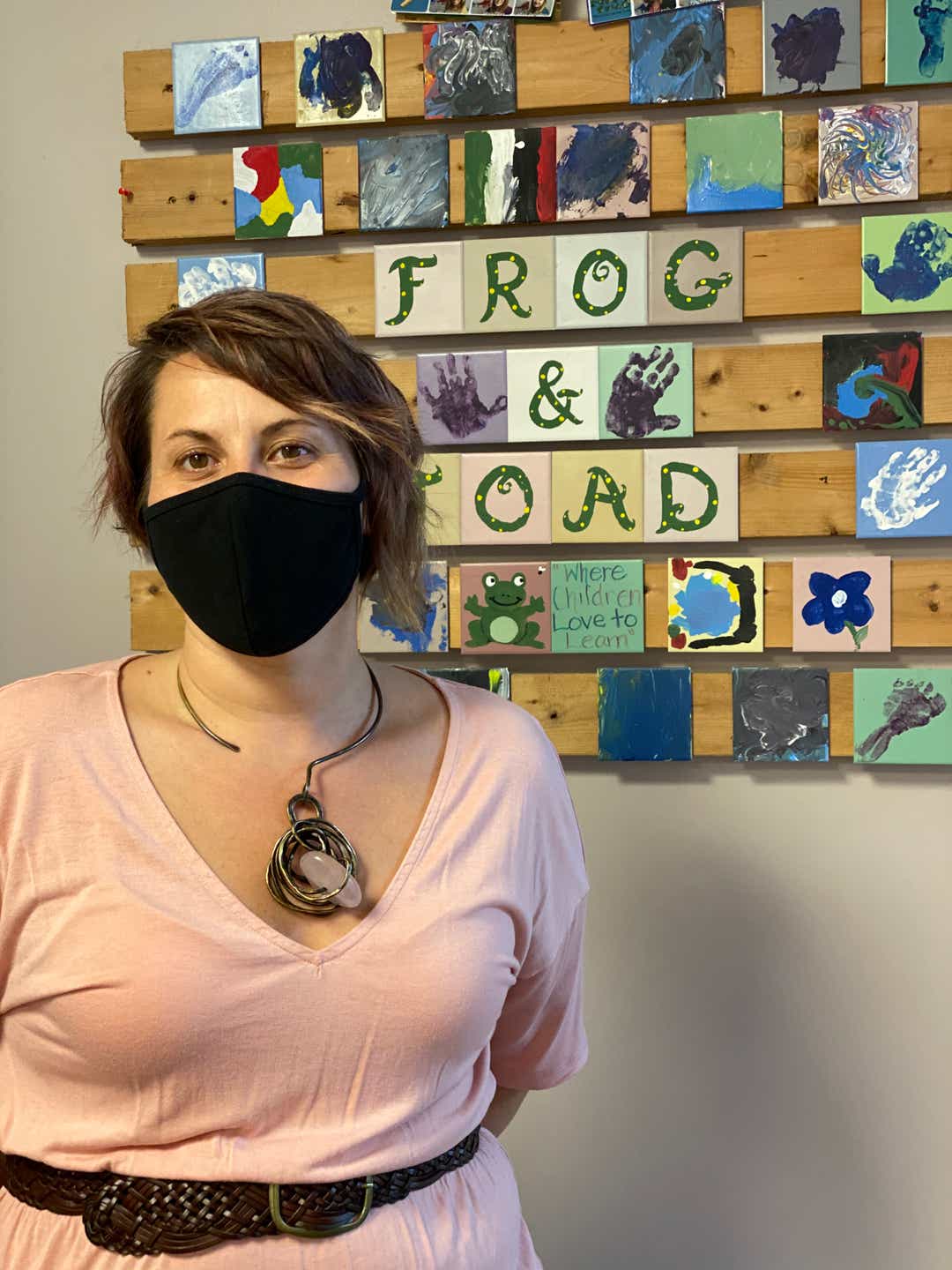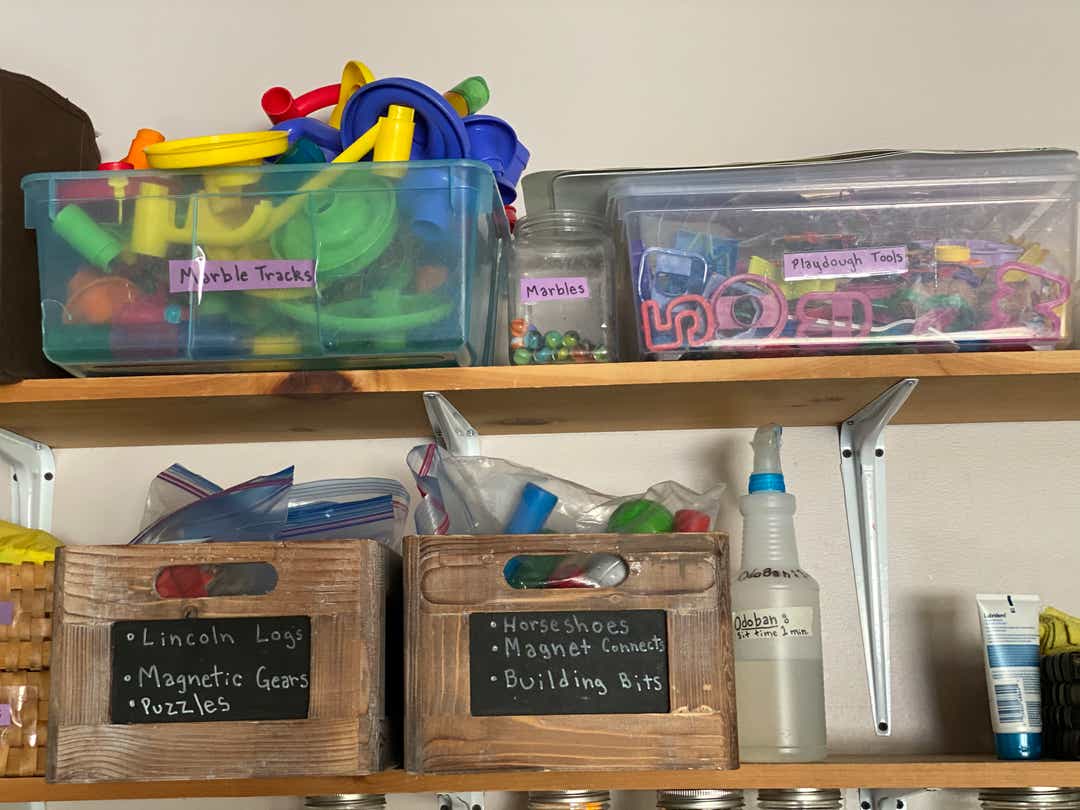ESSEX - Upon entering, the smell of hand sanitizer and disinfectant is apparent.
Plastic shower curtains, stark white, drape from the ceiling cordoning off an entry zone that would feel tight even by a little person's standards.
A worker puts a non-contact temperature gun in front of the forehead and goes through a quiz of symptoms and exposure. Upon passing the health check, one is ushered, hands off, under the squeaky vinyl curtain to the sterile environment beyond, into the gloved hands of masked caregivers.
This is the new reality of child care.
Vermont child care centers can reopen as of June 1, incorporating a host of new guidelines to help mitigate the spread of the new coronavirus. Providing for children is a necessary first step for parents to return to the workforce so the economy can rebound.
As centers like Frog & Toad Child Care in Essex make preparations to receive children, they are left questioning if new protocols are sustainable business practices and have concerns about the negative impacts this type of care could have on children, both short and long term.

One early education center's efforts to reopen
Tiffany Bergeron owns and runs two locations of Frog & Toad Child Care & Learning Center, an early education program serving 6-week-olds through preschool age.
The Burlington site stayed open to serve essential workers' children during the lockdown and expects to open to the general population near its capacity of 30 kids.
The larger Essex location was closed while undergoing facility modifications and a clearing out of potential pathogen-harboring materials in order to comply with safety regulations.
Bergeron delayed the five-star program's opening date to June 15 to accommodate staff finishing the school year with children at home and allow more time to prepare the space and adequately train staff on new guidelines. Licensed to serve 50 kids, the Essex location is expected to open with 11 and be at half capacity by August.
When asked to pay tuition costs for the two weeks between the centers' stabilization funding ending and children returning, parents surprised Bergeron with their willingness to support the programs.
More: Childcare providers report problems getting state funds, afterschool programs won't qualify
Regulations counter to best practices
Many of the required safety measures are in opposition to best practices in child care as suggested by the National Association for the Education of Young Children. They also go against Bergeron's centers' philosophy for providing a nurturing and enriching learning environment.
"We're not sure this is best and right for kids. We haven't been sold on that just yet," she said.
Bergeron understands the impact reopening child care has on the economy and admits that without doing so now, her own business may not survive.
So to prepare, she hung opaque shower curtains (because most of the clear ones were gone) over her half walls as sneeze guards. She has gotten rid of soft surfaces like stuffed animals and dress up clothes, a foam climbing structure for toddlers and the story corner's curtains. The centers will ban "loveys," stuffed animals or blankets from home which provide comfort during nap time.
Caregivers will be clad in face masks and face shields, wearing gloves and scrub tops. Bergeron anticipates some fear from children based on their appearance, particularly the youngest ages. Those caregivers will wear see-through face shields instead of cloth masks. Because of the obscuring of the mouths of workers and children three years and older, there will be lessons on using words and body language alternatives to smiling, to convey emotion and meaning.
Sensory play items such as water tables, sand and rice have been replaced by easily disinfected plastic toys. Taking a "one to wash and one to wear" approach, many play items will be stored up high, accessible for when others need to be cleaned.
During drop off, parents won't be allowed to come into the center to ease the transition. Handwashing stations will be placed outside and each child will get an individual medical check which, with 30 kids, greatly increases the admittance process time. Staff are told to limit face-to-face communication with parents, and instead connect digitally.
"This is going to be an emotional nightmare." she said. "Curriculum as we knew it, for a little while, is going to be by the wayside." She is providing trauma training for her staff and teaching will focus on social and emotional well-being and providing kids the words to express their big emotions.
She is hoping to convert playground time to outdoor classroom time as much as possible to make maintaining social distancing a little easier.

Living at the sink
Bergeron predicts cleaning time and materials to greatly impact the work day.
Between changing a shirt each time a baby drools on a worker, to immediately taking away a toy after it's been in a child's mouth, to washing hands between helping each child get lunch from home prepared, Bergeron says the sink, washing machine and dishwasher will be in constant use.
"We will live at the sink, wash our hands like that's our job."
One barrier, though, is a lack of training. Bergeron said facilities are required to have a health officer on site that is state trained, yet no training has been made available yet.
Safety at a high cost
So far, Bergeron has spent $6,000 to get her site ready for children, and expects the costs to continue to climb as staff go through masks, gloves, and disinfectant spray.
Sheets and blankets were upwards of $1,000, hundreds were spent on vinyl climbing mats, and quick-curing disinfectant spray, used on playground equipment and rugs, ran $212 for 5 gallons.
Bergeron has received state stabilization funding through the CARES Act and personal paycheck protection loans and expects $380 per child from the Child Development Division in restart grant funds. However, she expects to burn through that quickly.
Child care is not a money-making profession in good times, she said. "We are living right on the cusp of can we keep our doors open, or can we not?"
She said you get into child care because your heart is bigger than your head. Right now she is relying on both.
Contact April Barton at abarton@freepressmedia.com or 802-660-1854. Follow her on Twitter @aprildbarton.
This coverage is only possible with support from our readers. Sign up today for a subscription to the Burlington Free Press.
"care" - Google News
May 30, 2020 at 03:02AM
https://ift.tt/2ZQdGnG
Coronavirus: 1 Vermont child care facility finds challenges with reopening - Burlington Free Press
"care" - Google News
https://ift.tt/2N6arSB
Shoes Man Tutorial
Pos News Update
Meme Update
Korean Entertainment News
Japan News Update
Bagikan Berita Ini














0 Response to "Coronavirus: 1 Vermont child care facility finds challenges with reopening - Burlington Free Press"
Post a Comment